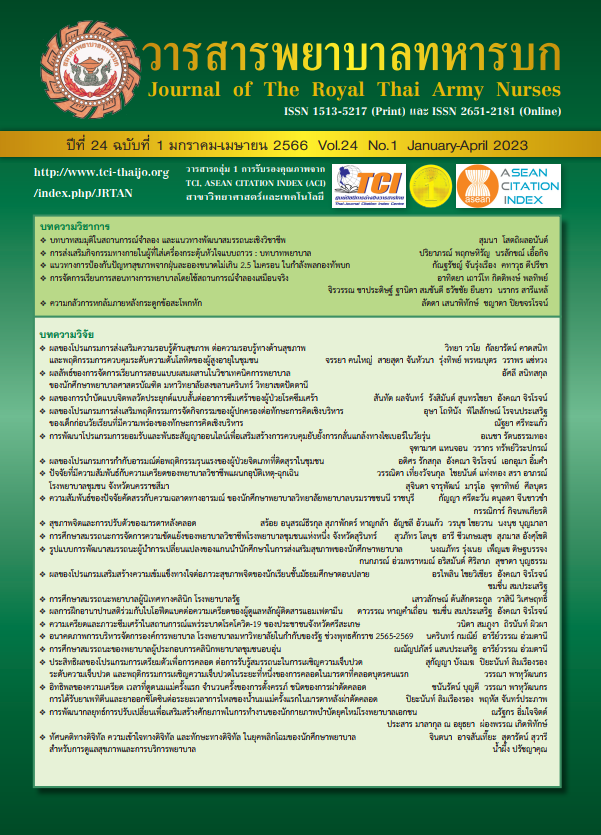Outcomes of Blended Learning in a Nursing Technique, Faculty of Nursing, Prince of Songkla University, Pattani Campus
Keywords:
Blended learning, Nursing studentAbstract
This quasi-experimental research aimed to determine the outcomes of the teaching styles with blended learning in a nursing technique. The target population was 63 nursing students in year 2. The research instruments were the academic achievement tests, and a blended teaching and learning outcomes assessment. The data analysis applied parametric statistics including percent, mean, standard deviation, and Pair t-test.
The results of the research found that 1) The students’ satisfaction and the results of the blended learning management were at a high level with an average value of 4.10 (SD = 0.34). 2) Outcomes of the teaching styles with blended learning were at a high level with an average value of 4.08 (SD = 0.53). 3) Learning achievement scores of blended teaching was at a good level with an average value of 43.01 (SD = 5.53). It was higher than the mean score in the normal teaching styles with an average value of 35.47 (SD = 4.07) with a statistically significant difference at .05
Downloads
References
Panich V. The way to create learning for students in the 21st century. Bangkok: Sodsri Saritwong Foundation; 2012. (in Thai)
Sasuk A. A study of the achievement of Blended Learning to promote classroom participation and change students’ attitudes Mattayomsuksa 4 level in the course D 31101 Information Technology (Research Report). 2013. Bangkok: Kasetsart University. (in Thai)
Poolsawat M. The Development of Online Learning on Data Communication and Networkfor Mathayomsuksa 2 Students. Social Sciences Research and Academic Journal. 2016; 11(33): 131-42. (in Thai)
Nantsupawat A. Nantsupawat R. Satisfaction and Outcomes of the Teaching Styles with Blended Learning in a Nursing Leadership and Management Course, Faculty of Nursing, Chiang Mai University. Nursing Journal. 2013; 40 (extra): 47-60. (in Thai)
Maliwan N, Kaemkate W. Journal writing for enhancing achievement and attitude towards mathematics learning of lower secondary school students: A development analysis. Online Journal of Education. 2014; 9(1): 222-35. (in Thai)
Hoskisson K. Tompkins G.E. LanguageArts: Content and teaching strategies. New York: Merrill Publishing; 1987.
Rueangsawat S. Saetew P. Choome P. The Effect of Blended learning Management on 21st Century Learning Skills For Nursing Students, Boromarajonani College of Nursing, SuratThani. Journal of The Royal Thai Army Nurses. 2020; 21(1): 235-44. (in Thai)
YimyamS, Charuwatcharapaniskul U, Chareonsant J, Indarangkura Na Ayutthaya A, Xuto P, Chaloumsuk N. Developing on Blended Learning for Developing the 21st Century Learning Skills. Nursing Journal. 2015; 42 (extra): 129-40. (in Thai)
Sinthukot P. Monthawee S. Effect of a Blended Learning Instruction on Learning Achievement in Child and Adolescent Nursing 2 Subject of the Third Year Nursing Students of The Thai Navy College of Nursing. Royal Thai Navy Medical Journal. 2020; 47(1): 158-71. (in Thai)
Bangthamai P. Srisomphan K. Somnukprasert W. Weerawatthanodom N. Effects of Blended Learning and Childbirth Delivery Simulation Based Learning on Academic Achievement, Satisfaction and The Students’ Opinions Towards Teaching by Reflective Thinking of Nursing Students, Boromarajonani College of Nursing Nonthaburi. Journal of The Royal Thai Army Nurses. 2020; 21(3): 350-59. (in Thai)
Sucaromana U. The effects of blended learning on the intrinsic motivation of Thai EFL student. Canadian Center of Science and Education 2013;6 (5):141-7.
Downloads
Published
How to Cite
Issue
Section
License
Copyright (c) 2023 Journal of The Royal Thai Army Nurses

This work is licensed under a Creative Commons Attribution-NonCommercial-NoDerivatives 4.0 International License.
บทความหรือข้อคิดเห็นใดใดที่ปรากฏในวารสารพยาบาลทหารบกเป็นวรรณกรรมของผู้เขียน ซึ่งบรรณาธิการหรือสมาคมพยาบาลทหารบก ไม่จำเป็นต้องเห็นด้วย
บทความที่ได้รับการตีพิมพ์เป็นลิขสิทธิ์ของวารสารพยาบาลทหารบก
The ideas and opinions expressed in the Journal of The Royal Thai Army Nurses are those of the authors and not necessarily those
of the editor or Royal Thai Army Nurses Association.






